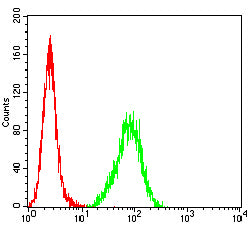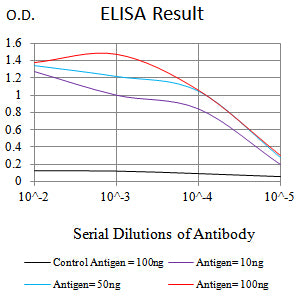

| WB | 咨询技术 | Human,Mouse,Rat |
| IF | 咨询技术 | Human,Mouse,Rat |
| IHC | 咨询技术 | Human,Mouse,Rat |
| ICC | 技术咨询 | Human,Mouse,Rat |
| FCM | 1/200-1/400 | Human,Mouse,Rat |
| Elisa | 1/10000 | Human,Mouse,Rat |
| Entrez GeneID | 712 |
| clone | 1C9G9 |
| WB Predicted band size | 26kDa |
| Host/Isotype | Mouse IgG2b |
| Antibody Type | Primary antibody |
| Storage | Store at 4°C short term. Aliquot and store at -20°C long term. Avoid freeze/thaw cycles. |
| Species Reactivity | Human |
| Immunogen | Purified recombinant fragment of human C1QA (AA: 96-245) expressed in E. Coli. |
| Formulation | Purified antibody in PBS with 0.05% sodium azide |
+ +
以下是关于C1QA抗体的3篇文献简要概述:
1. **"Autoantibodies to C1q in systemic lupus erythematosus"**
- **作者**:Trouw LA, Groeneveld TW, Seelen MA, et al.
- **摘要**:该研究探讨系统性红斑狼疮(SLE)患者中抗C1q抗体的作用,发现其与肾脏疾病(狼疮性肾炎)高度相关,提示抗C1q抗体可能通过干扰补体激活途径参与疾病进展。
2. **"C1q and the immune complex diseases: A mechanistic perspective"**
- **作者**:Kishore U, Ghai R, Greenhough TJ, et al.
- **摘要**:综述C1q蛋白(包括C1QA亚基)在免疫复合物清除中的作用,指出抗C1q抗体可能破坏补体介导的免疫复合物清除机制,导致自身免疫性疾病(如SLE)的病理损伤。
3. **"Anti-C1q autoantibodies enhance complement activation and are associated with severe disease in lupus nephritis"**
- **作者**:Daha NA, van der Vlag J, Kamerling SW, et al.
- **摘要**:研究发现抗C1q抗体通过与C1q结合促进补体过度激活,加剧SLE患者肾脏炎症,提示其作为狼疮性肾炎严重程度的生物标志物。
以上文献聚焦于C1QA相关抗体在补体系统调控及自身免疫疾病中的机制与临床应用。
×